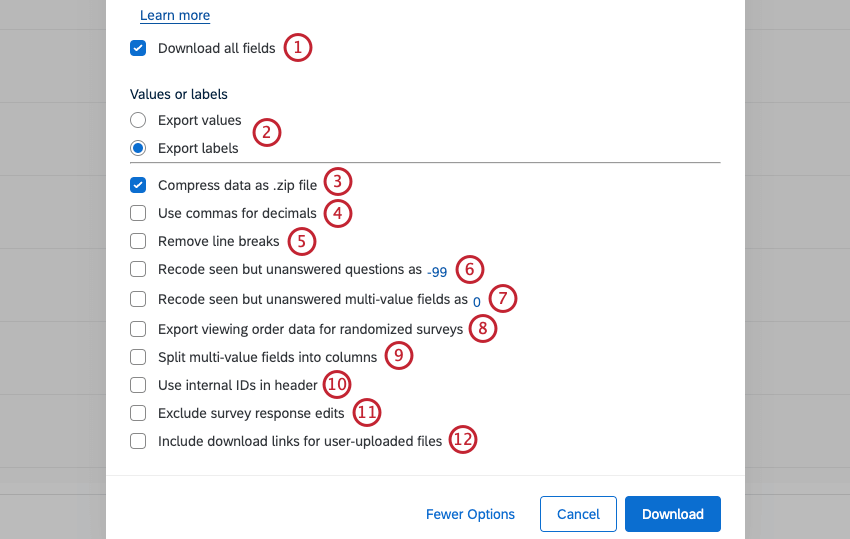Data Export Options
About Export Options
In addition to choosing the file format of your data export, you have various options for customizing your data output. You can review and change your data output every time you download a file by using the various export options.
Export Options when Using Download Data Table
The Download Data Table window will appear when you export your data.
Options 3-12 are accessed by clicking the More Options button at the bottom-left of the Download Data Table window.
- Download all fields: When this option is checked, all possible columns of data are exported. When this option is unchecked, only columns currently displayed in the Data & Analysis tab are exported.
- Export values/labels:
- Export values: Instead of exporting the text of the answer choice, the Recode Value for the answer choice is exported.
Qtip: If you only have answer choices 1-5 and you see much larger numbers in your exported data, you may need to check your Recode Values. Adding and removing answer choices can cause your Recode Values to become out of order. You can change these coded values after you’ve collected your data without invalidating your results. Visit the Recode Values page to learn more.
- Export labels: The data is exported as full answer choice text.
Qtip: If the text that exports looks different from what you set in the survey editor, you may have set Variable Names or Question Labels. These options are recommended if you want to shorten the column names and answer text that exports in your data. Visit the linked pages to learn how to edit or remove them.
- Export values: Instead of exporting the text of the answer choice, the Recode Value for the answer choice is exported.
- Compress data as .zip file: The data is exported as a compressed .zip file to reduce the overall file size.
- Use commas for decimals: All decimal characters in the data output are replaced by commas.
- Remove line breaks: In a Text Entry question, respondents can use line breaks to separate paragraphs. This option removes those breaks, and turns the text response into a single solid block of text.
- Recode seen but unanswered questions as -99: By default, questions that participants chose not to answer are left blank in the survey data. When this option is enabled, any questions that participants saw and chose not to answer are coded as a value of -99 (or any other number you specify by clicking on the number and editing it) to distinguish them from questions participants didn’t see.
- Recode seen but unanswered multi-value fields as 0: This option is similar to “Recode seen but unanswered questions as -99” and can only be enabled if that option is also selected. Additionally, your exported data will only show this option if “Split multi-value fields into columns” is also selected, because multi-value fields must be in their own column to display the value as 0 (or any other number you specify by clicking on the number and editing it). This identifies answer choices which were shown to a respondent but were unanswered.
- Export viewing order data for randomized surveys: When this option is enabled, columns are added to your dataset for each randomized element in your survey. These columns contain information on the order in which your randomized blocks, questions, or answer choices were displayed to the individual respondent.
Qtip: Export viewing order data is not compatible with Split multi-value fields into columns if the blocks in the randomizer have the same name.
- Split multi-value fields into columns: Certain question types allow for multiple answer choices to be selected for a single question. This option splits each possible answer to the question into a unique column, rather than combining every chosen answer into a single column.
- Use internal IDs in header: With this option checked, the question column headers display the internal IDs (which cannot be edited) as assigned by Qualtrics. With this option unchecked, question column headers display the editable question number (e.g., Q4).
- Exclude survey response edits: When this option is enabled, edits made to survey responses won’t show up in your dataset.
- Include download links for user-uploaded files: This option adds a column to your dataset for every file upload question in your survey. This column contains links that allow you to view and download user-uploaded files.
Exporting Data in Different Project Types
You can export response data in many different types of projects. The steps and options described on this page apply to the following project types:
There are a few other types of projects where you can export response data. However, there are important differences to keep in mind:
- For Imported Data projects, see Data & Analysis in Imported Data Projects.
- For 360 projects, see Exporting Response Data (360).
- For all other Employee Experience projects, see Exporting Response Data (EX).
- For Conjoint, see Exporting Raw Conjoint Data.
- For MaxDiff see Exporting Raw MaxDiff Data.
